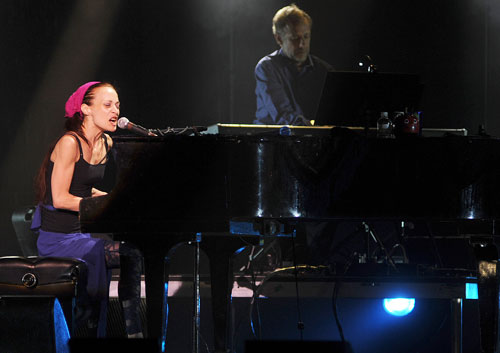Fiona Apple sings from her core

Fiona Apple doesn’t just sing her songs, she wears them like an added layer of skin.
Nearly her every word ripples across her features, her emotions telegraphed by facial expressions as malleable as Play Doh and eyebrows arched like the back of an angry cat.
At the Joint at the Hard Rock on Saturday, Apple often began songs with her eyes closed, hands clasped behind her waist, as if she was holding herself back from something.
This seldom lasted long.
Caught up in the tune, she’d soon be stomping her feet like a kid squishing ants, swinging her arms out as if she was trying to free them from their sockets or clenching her skirt in her fists, white-knuckling the fabric the way you would a car’s steering wheel while navigating perilous weather.
"I-I-I-I-I just want to feel everything!" she exclaimed on "Every Single Night," looking like she was doing just that.
That number opens Apple’s latest disc, whose title is a run-on sentence that we’ll abbreviate to "The Idler Wheel."
It’s followed on the album by "Daredevil," which Apple also performed on Saturday, during which she implored "Don’t let me ruin me."
But on the next verse, she turned all that anxiety and ardor in on itself, harnessing these intense feelings into something that uplifts and invigorates rather than undermines, as might have been the case in the past.
"Oh give me anything, and I’ll turn it into a gift," she sang sweetly, knowingly.
Those two songs are as good an encapsulation of where Apple’s head is at these days as you’re going to get for something so difficult to encapsulate to begin with.
Having just turned 35, Apple hasn’t necessarily reached a place of comfort or stability, but she does show confidence in her ability to wrangle inner tumult into outer assuredness.
She’s no longer the "Sullen Girl" that she claimed to be in the song of the same name on her 1996 debut "Tidal," released when she was but 18 years old.
Back then, Apple treated her emotional well-being like a scab that she picked at until it bled.
Nowadays, she exhibits a bit more control over that which once controlled her.
"I don’t cry when I get sad anymore," she sang on another new song, "Left Alone," an up-tempo, jitterbug vamp propelled by a roiling, cascading piano line.
In many places, "The Idler Wheel" is intricately arranged and delicate sounding, but live, Apple and her four- piece backing band added torque and texture to the songs, fleshing them out, lingering in places, with a guitarist who soloed at will and added both dissonance and slide guitar longing in place.
Apple wrapped and stretched her vocals around these shifting contours effortlessly.
At times, her voice was like tendrils of smoke rising from a fire, wispy and skyward bound, but from a heated place.
At others, it was a pained, guttural bray, agonized and ugly, as if she was spitting up internal organs.
She was at her most visceral and vehement on "Sleep to Dream" and "Tymps (The Sick In the Head Song)," which she sang through clenched teeth at times; her softest and most forgiving on "Anything We Want" and hushed ballad "I Know," where The Joint grew so quiet, you could hear the pages of a reporter’s notebook turn.
Watching her perform, Apple seemed to be fully committed to the moment, losing herself in the present as a way of moving on from the past.
"If there was a better way to go then it would find me / I can’t help it, the road just rolls out behind me," she sang on "Extraordinary Machine," barreling down said road, eyes averted from the rearview mirror.
Contact reporter Jason Bracelin at jbracelin@reviewjournal.com or 702-383-0476.